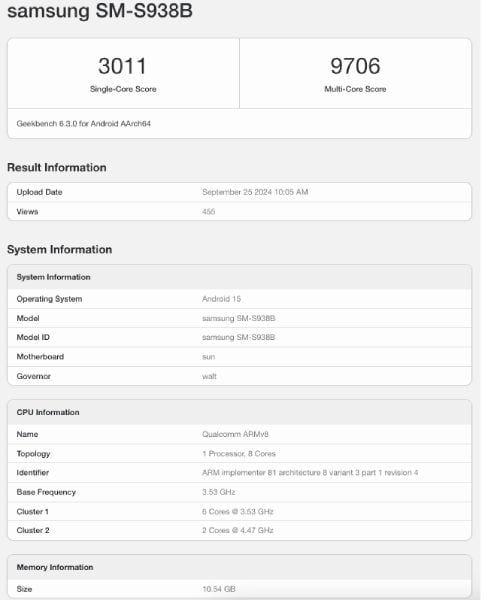Just a day after its initial benchmark appearance on Geekbench, Samsung’s upcoming Galaxy S25 Ultra has been tested again. This time, it shows an increased CPU frequency for the Snapdragon 8 Gen 4 chip.
Enhanced CPU Frequencies
The latest benchmark indicates that the two prime cores of the SoC are now running at 4.47 GHz, which is an increase from the previous 4.19 GHz recorded yesterday. Additionally, the six efficiency cores have also seen a frequency rise, moving from 2.90 GHz to 3.53 GHz.
This likely marks the highest clock speeds recorded for the Snapdragon 8 Gen 4 so far, encompassing both performance and efficiency cores. This is to be expected since Samsung typically utilizes customized "Snapdragon for Galaxy" chips in its flagship S-series smartphones. These custom chips usually feature higher clock speeds compared to the standard versions. Hence, it’s probable that the chip in the S25 Ultra is the Snapdragon 8 Gen 4 "for Galaxy" variant.
Performance Scores
As anticipated, the new benchmark run indicates an improved performance score for the Galaxy S25 Ultra on Geekbench, particularly in the multi-core test, which has risen from 9080 to 9706 points. However, the single-core performance experienced a minor decline, now standing at 3011 points, down from 3069.
It’s important to keep in mind that these are initial benchmarks for the device, and Samsung still has work to do for optimization to maximize the SoC’s potential. While synthetic benchmarks can give insight into the phone’s abilities, they do not always accurately reflect real-world performance. Instead, they provide a general idea of how the device might perform in everyday use and how it stacks up against competitors.
Comparison with Competitors
For example, looking at the latest Geekbench results, the iPhone 16 Pro Max surpasses the S25 Ultra in performance. The iPhone achieves approximately 3,400 points in single-core tests and around 8,300 in multi-core benchmarks. As is commonly seen, the iPhone excels in single-core performance but falls behind in multi-core tests when compared to its Android rival.


Leave a Reply